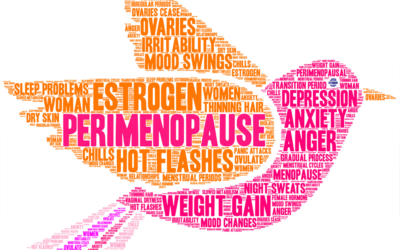

Are You Navigating the Symptoms of Perimenopause?

When I was in my mid-forties I started experiencing a number of seemingly unrelated symptoms – weight gain, brain fog, sore joints, and fatigue. I tried all sorts of one-off fixes – diets, exercise programs, and magic pills – without success. It wasn’t until my period started changing and I experienced hot flashes that the penny dropped and I connected everything to perimenopause. Did it happen like that for you too?
I wonder why there isn’t more talk about perimenopause? After all, it happens to all ladies, although it’s true that some have more challenges with it than others.
Perimenopause (and menopause) is the bookend to puberty, the reproductive part of our lives. So it includes a lot of hormone changes as the reproductive hormones – primarily estrogen and progesterone – naturally decline.
But the real challenge comes with how those changes impact our wellbeing. Like mood swings, inability to sleep, extreme fatigue, joint pain, digestive issues, hot flashes, night sweats, low sex drive and weight gain. What’s up with all that? Why can’t we just wind up our periods and call it a day?
There are two paths for getting help with perimenopause. The medical path and the lifestyle path. Unfortunately, many doctors are not well equipped to help. The American Association of Retired Persons reports most medical schools and residency programs don’t teach physicians in training about menopause. To make matters worse, a recent survey found that just 20% of ob-gyn residency programs provide any kind of menopause training.
When asked, 3 out of 4 ladies reported they did not get adequate treatment when they brought perimenopausal and menopausal concerns to their doctors. And 84% of women say their symptoms interfere with their lives and some are even debilitating.
One of the main areas where doctors should be able to help is in prescribing Hormone Replacement Therapy (HRT). Even though treatment has changed dramatically over the past decade, many doctors are unaware. The new body identical treatment is administered in patches or gel and poses none of the earlier health concerns for breast cancer and heart disease. The topical delivery method means that the liver is completely bypassed, and that absorption through the skin dramatically changes the health risks. Dr. Louise Newson, The Menopause Doctor, goes so far as to encourage women to consider taking body identical HRT for the protections it provides against heart disease, osteoporosis, diabetes and Alzheimer’s.
The other path to get help with the symptoms of perimenopause is through lifestyle. There is a lot that lifestyle habits and behaviors can do to demystify the changes. It turns out the healthy practices of diet and exercise that ladies maintained before perimenopause are unlikely to suit them very well once they enter perimenopause. As our nutrition needs change, so does our digestion. We no longer need all the protein we used to eat, and our sensitivity to sugar and processed foods heightens. Bloating, brain fog, joint pain and weight gain result.
And with hormonal changes to our muscles and joints, the type of exercise and movement that is beneficial also changes. Even if you have always been athletically active, the fatigue and joint pain can make ambitious workouts very difficult. In fact, high impact and anaerobic exercise can cause stress to the system and result in the production of cortisol, the stress hormone. The timing and type of movement you choose take on new importance.
Hormonal changes impact sleep, especially when combined with food choices and stress. So figuring out new sleep hygiene habits are vital to being able to restore the body each night with quality sleep. As we sleep, the body is busy removing dead cells burning fat and rebuilding tissue. The brain catalogues the day’s experiences and builds up memories. Without adequate sleep, the body is stressed when it cannot carry out these maintenance functions and produces cortisol in response. That in turn stimulates appetite, which produces more insulin leading to fat production (and stubbornly stored around the middle). So getting enough good sleep is vital to being able to adapt through the changes of perimenopause.
And finally, mindfulness – getting your head in the game is so important. As it happens, the mind can only focus on one thing at a time. So if you control some of the things you tell yourself and make them positive things, you will benefit from that. Rather than tell yourself that you’re a lazy slob or beat yourself up because you don’t have enough willpower, you tell yourself that you’re an intelligent woman and the goal is achievable. Meditation is a great way to calm the mind, focus on positive things and create endorphins. This can really help to create positivity, reduce cortisol levels and help with sleep.
Are you satisfied with the support your doctor has been giving you for the symptoms of perimenopause? Some symptoms are best resolved using HRT. But many more can be resolved by taking a lifestyle approach.
The beginning of my perimenopausal journey didn’t go well, and I’m determined to help ladies navigate this chapter of their lives so they can take control of the next decades and live their best lives.
To find out how you can navigate the symptoms of perimenopause, click the button to book your free call with Dyna Vink, Health and Nutritional Coach.
Menopause is Not a Disease!

My mother, like many of her generation, called menopause “the change of life.” Unspoken was the assumption that life afterward would be pretty much downhill and diminished. Thankfully, we no longer accept the outdated notion that menopause signals the end of a vibrant and healthy life.
While menopause poses many physical and psychological challenges, it also provides us with an opportunity to make health gains that will contribute to ongoing vitality and wellness.
We often refer to menopause as if it were an event, or worse yet, as a disease! However, “menopausal transition” is a more accurate way of describing the process of hormonal changes that takes place in stages over several years, leading to the end of our reproductive years.
Perimenopause (meaning “near menopause”) is the beginning of the menopausal transition and signals the gradual decline of reproductive functions. Menopause is the point in time when menstrual cycles have not occurred for 12 consecutive months, and marks the end of our reproductive years.
For most women, perimenopause begins in their early to mid-40s and may last anywhere from 2 to 10 years. During perimenopause, women experience a decrease in the production of reproductive hormones, estrogen and progesterone, as the body prepares to shut down the ovaries. In turn, hormonal fluctuations and imbalances trigger many different symptoms, such as irregular periods, hot flashes, night sweats, mood swings, anxiety, poor sleep, reduced libido, “brain fog”, and weight gain. Profound changes in cardiovascular health, bone strength, and cell proliferation can also take place during the menopausal transition, which can raise a woman’s risk of developing heart disease, osteoporosis, and certain cancers.
Can HRT Help?
In recent decades, women seeking relief from menopausal symptoms were prescribed hormone replacement therapy (HRT), primarily estrogen, to alleviate hormonal imbalance. But newer formulations of body identical HRT provide much improved delivery methods by using patches and creams. These variations no longer have the risk of breast cancer and stroke. In fact, they have the added value of providing protection from heart disease, pre-diabetes, osteoporosis and Alzheimer’s.
But hormone treatment is not the complete solution and much can be done by turning to more holistic ways to address the symptoms of menopause, while also embracing positive lifestyle changes to support healthy aging.
What can you do to treat your menopausal symptoms and navigate this challenging phase of your life? You may wish to consider the following lifestyle adjustments as a first resort. These carry no risks and promise many benefits for your physical and mental health.
Fuel Your Body with a Nutritious Diet
A healthy diet is essential for easing many debilitating symptoms of menopause. Your body needs whole foods that are rich in nutrients to promote hormonal production and balance, and supplements where necessary to help fight bone density loss.
Choose foods that include:
Lean protein, organic and free of grain feed (grass-fed beef and lamb, free-run chicken and eggs, wild fish): these foods help maintain hormonal balance
Healthy fats (flax, olive oil, avocado, nuts): these foods help reduce hot flashes and night sweats
Phytonutrients (dark, leafy green vegetables, red, orange and yellow vegetables, onions, garlic): these foods have natural compounds that provide antioxidant and anti-inflammatory properties that may also enhance immunity.
At the same time, avoid processed foods. These can aggravate hormonal imbalances,
and cause inflammation and related pain. Lowering your intake of sugar, saturated and trans-fats, refined carbohydrates, gluten, dairy, and alcohol are good habits to embrace during the menopausal transition.
Gut health is also critical during all stages of menopause. Hormonal imbalance can disrupt healthy digestion and prevent your body from absorbing nutrient-rich food. This can lead to bloating and other digestive issues. Adding a daily probiotic supplement can improve your digestive function, help stabilize hormonal production, and increase absorption of nutrients.
Treat Your Body to Daily Movement
Research confirms that movement is vital in balancing hormones, elevating mood, promoting sleep, and addressing the symptoms of menopause.
Regular low-intensity and aerobic exercise (such as walking, yoga and aquafit) helps to lower stress, reduce cortisol levels, and burn fat. High-intensity training (such as cardio workouts) stimulates production of the human growth hormone (HGH), releasing fat, building muscle, and improving insulin sensitivity. Strength training or weight-bearing exercise helps increase bone density as well as muscle, to protect against osteoporosis. However, a body in menopause can get too much of this type of exercise, so it’s recommended to stick with small weights and your own body weight for resistance.
Embrace Your Sexuality
Your sexuality does not end with menopause. Although your libido may not be as strong as during your pre-menopausal years, this is an excellent time to focus attention on your sensual self as you move into the freedom of post-fertility. Sexual pleasure – by yourself or with a partner – brings hormonal benefits and helps with mood regulation. Don’t hesitate to seek relief from troublesome symptoms (such as vaginal dryness) through readily-available intimacy oils or estrogen creams.
Promote Sleep
With all the hormone changes that take place during menopause, many women find it difficult to get quality sleep. This can cause a cascade of problems such as an over-production of cortisol, which stimulates appetite and causes an interaction with insulin and weight gain. A lack of sleep also causes symptoms of anxiety, depression and mood swings. Energy tends to be low as fatigue takes over. Perhaps the biggest health concern is that without sleep, the body doesn’t get the opportunity to restore itself and remove toxins and dead cells. So developing good sleep habits is more important than ever.
There is no question that the menopausal transition can be very challenging, touching almost every aspect of our lives. But with mindful attention, holistic approaches, healthy habits, and the help of support networks, you can experience the “change of life” as a change for the better!
To find out how you can navigate the symptoms of menopause, click the button to book your free call with Dyna Vink, Health and Nutritional Coach.

Holistic Nutrition Lifestyle | Copyright © 2025 | All Rights Reserved
“This site is not a part of the Facebook website or Facebook Inc. Additionally, this site is NOT
endorsed by Facebook in any way.
FACEBOOK is a trademark of FACEBOOK, Inc.”